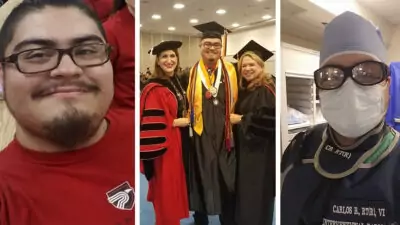Title IX FAQs
What is Title IX?
Title IX is a federal law that protects individuals from sex discrimination in any education program or activity receiving federal financial assistance. There are other laws that also protect students and employees from sex discrimination, including Title VII of the Civil Rights Act of 1964 (federal law) and Florida Educational Equity Act.
Title IX is only for athletics–right?
No, not entirely. Title IX addresses discrimination based on sex/gender. Title IX considers sexual harassment as a form of sex/gender discrimination and it requires that all incidents of sexual harassment be viewed as discrimination and be investigated.
As a student at Polk State College, am I protected from sex discrimination?
Yes, it is unlawful to discriminate against Polk State College students because of their sex.
Is it possible to be sexually harassed/assaulted by someone of the same gender?
Yes. If you have been subjected to unwanted sexual contact or sexual harassment, your gender and the gender of the alleged perpetrator are irrelevant. Such conduct is prohibited by Title IX.
What is sex discrimination under Title IX? How is it defined?
Sex discrimination includes sexual harassment and sexual assault. Discrimination is the unequal treatment of a person based on that person’s gender. This prohibition covers any term or condition of employment, academic program, student service, activity, benefit, or opportunity provided by Polk State College.
Sexual harassment is defined as unwelcome sexual advances, requests for sexual favors, and other verbal or physical conduct of a sexual nature. Sexual harassment exists when any of the following occur:
- Unwelcome sexual advances, requests for sexual favors, and other verbal or physical conduct of a sexual nature has the purpose or effect of unreasonably interfering with an employee’s work performance or a student’s academic performance or creating an intimidating, hostile, or offensive employment or educational environment.
- Submission to unwelcome sexual advances, requests for sexual favors, and other verbal or physical conduct of a sexual nature are made either explicitly or implicitly a term or condition of an individual’s employment or a student’s status in a course, program, or activity.
- Submission to or rejection of unwelcome sexual advances, requests for sexual favors, and other verbal or physical conduct of a sexual nature by an employee or student is used as the basis for employment or academic decisions affecting that employee or student.
Sexual assault is defined by the criminal sexual conduct statutes of Florida as a crime involving forced or coerced sexual penetration (first and third-degree) or sexual contact (second and fourth-degree). Sexual assault can occur either forcibly (against a person’s will) or when a person cannot give consent. When a person cannot give consent it means the person does not have the capacity to agree to participate in consensual sex. Examples include individuals who are under the age of consent, intoxicated, developmentally disabled, mentally/physically unable to consent, etc. Anyone engaging in sexual contact with someone who is unable to give consent may be committing sexual assault.
What are some examples of sex discrimination, sexual harassment, and sexual assault?
Depending on the particular circumstances, sex discrimination, sexual harassment, or sexual assault may include, but is not limited to the following:
- Physical assaults of a sexual nature, such as rape, sexual battery, molestation, or attempts to commit these assaults; and intentional physical conduct that is sexual in nature such as touching, pinching, patting, grabbing, poking, or brushing against another individual’s body.
- Offering or implying an employment-related reward (such as a promotion, raise, or different work assignment) or an education-related reward (such as a better grade, a letter of recommendation, favorable treatment in the classroom, assistance in obtaining employment, grants or fellowships, or admission to any educational program or activity) in exchange for sexual favors or submission to sexual conduct.
- Threatening or taking a negative employment action (such as termination, demotion, denial of an employee benefit or privilege, or change in working conditions) or negative educational action (such as giving an unfair grade, withholding a letter of recommendation, or withholding assistance with any educational activity) or intentionally making the individual’s job or academic work more difficult because sexual conduct is rejected.
- The use or display in the classroom or workplace, including electronic, of pornographic or sexually harassing materials such as posters, photos, cartoons or graffiti without academic justification.
- Unwelcome sexual advances, repeated propositions or requests for a sexual relationship to an individual who has previously indicated that such conduct is unwelcome, or sexual gestures, noises, remarks, jokes, questions, or comments about a person’s sexuality or sexual experience. Such conduct among peers must be sufficiently severe, persistent, or pervasive that it creates an educational or working environment that is hostile or abusive. A single incident involving severe misconduct may rise to the level of harassment.
What should I do if I think I have been discriminated against?
The best way to stop any kind of discrimination is to tell someone who is trained to hear complaints and that person will investigate and, when appropriate, take steps to stop the discrimination.
Who should I tell if I believe I have been discriminated against?
There are several people at Polk State College trained to address complaints of gender discrimination. Polk State College’s Title IX Coordinator oversees compliance with all Title IX related matters, including the handling of complaints. Additional contacts are the Director, Human Resources; Student Services Deans; Ombudsman; Campus Security; and the ADA Coordinator. These individuals will forward the complaints to the Title IX Coordinator.
If an incident of sexual violence occurs off campus, can the College investigate?
Yes, if the incident has sufficient ties to Polk State College (if it occurs at a Polk State College event; if it involves a Polk State College student, staff member, or faculty member, etc.), then Polk State College can investigate and provide resolution.




